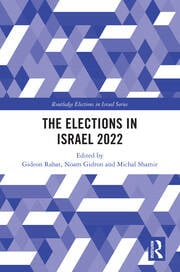-
17 Feb 2025 • Book
The Elections in Israel 2022
AbstractThe 2022 Israeli elections stand out as a turning point in the country’s political history. Following a period of unprecedented political instability, the right-wing government formed following the elections—Benjamin Netanyahu's sixth government—was the most radical in Israel’s history.This book examines the 2022 Israeli elections through various theoretical perspectives
… show more -
17 Feb 2025 • Journal Article • The Elections in Israel 2022
From 44 to 4: The Electoral Decline of the Israeli Labor Party, 1992–2022
AbstractThis chapter examines the patterns of decline in support for the Israeli Labor Party across social groups. The transformation of Labor from a ruling party into a small marginal party is one of the most conspicuous phenomena in the Israeli party system of the past 30 years (1992–2022). Based on official election results, we compare the overall nationwide change in Labor's
… show more -
17 Feb 2025 • Journal Article • The Elections in Israel 2022
The Elections in Israel Book Series as a Test Case: Does the Research Reflect the Personalization of Israeli Politics or Does It Adhere to the Party Politics Paradigm?
AbstractThe chapter uses election research in Israel as a test case to examine whether research reflects major developments in politics. Specifically, it explores whether the research of Israeli politics reflects the findings that in Israel personalization has been particularly deep and comprehensive, permeating all arenas: institutional, behavioral and the mass media. To
… show more -
16 Feb 2025 • Journal Article • Electoral Studies
Institutional personalism and personalised behaviour: Electoral systems, candidate selection methods, and politicians’ campaign strategy
AbstractIn this study, we investigate how two crucial political institutions – the electoral system and the intraparty candidate selection method – incentivise elite personalistic campaigning behaviour. We offer two contributions. First, we show the interactive effect of the two institutions on elite behaviour in campaigns, unlike most of the extant literature that focuses on
… show more -
13 Jan 2025 • Journal Article • Frontiers in Political Science
What Constitutes a New Party? The Lack of a Standard Operationalization and the Way Forward
AbstractThis mini-review examines scholars' responses to the question, "What constitutes a new party?" It proposes a path out of a situation in which there is no one standard answer to this question, or even a dominant answer. The absence of a standard or dominant answer creates an interesting setting for theoretical and methodological creativity. At the same time, the situation
… show more -
May 2024 • Journal Article • Social Science Quarterly
The personalization of the Likud in the era of Netanyahu
AbstractObjective
Under the leadership of Benjamin Netanyahu, Likud—Israel's most successful political party in the past 50 years—transformed from a highly institutionalized leader party into a personal party. This study explores the personalization of Likud and its various manifestations and analyses the causes of this process and its consequences.
Methods
A case study
… show more -
29 Mar 2024 • Journal Article • Collegial Democracy versus Personal Democracy
Collegial versus personal cabinets and governments 1
AbstractIn this chapter, we develop a comprehensive typology, alongside measurements of personalism and collegialism, of cabinets and governments in democracies. The scholarly literature identifies and addresses the personal and collegial elements within governments in democracies, but falls short of proposing a comprehensive typology and compatible measurements. We present
… show more -
29 Mar 2024 • Journal Article • Collegial Democracy Versus Personal Democracy
Collegial versus personal political parties
AbstractAfter briefly presenting a classification of collegial and personal parties, this chapter outlines three useful indices of centralized personalism in parties at the country level. They examine (1) the formal power of the party leaders, based on the codification of party regulations; (2) an estimation of the centrality of the party leaders in their parties, based on an
… show more -
29 Mar 2024 • Journal Article
Introduction: Collegial versus personal democratic institutional order
AbstractThe introductory chapter frames the conceptual and theoretical bases for the distinction between personal and collegial democracies that our book proposes. It presents three pure types of democratic institutional order: centralized-personal, collegial, and decentralized-personal. It then shows how the classification of personal versus collegial democratic orders
… show more -
29 Mar 2024 • Book
Collegial democracy versus personal democracy: ‘We' the People or ‘I' the People?
AbstractThis book examines two patterns of democracy – collegial and personal – through a comprehensive comparison of political institutions. It develops a conceptual, theoretical, and methodological basis for differentiating collegial and personal democracies. Central institutions in democracy are classified according to their levels of personalism and collegialism, including
… show more










